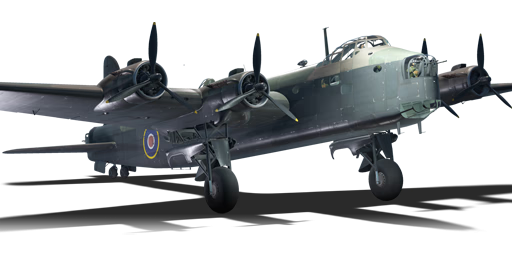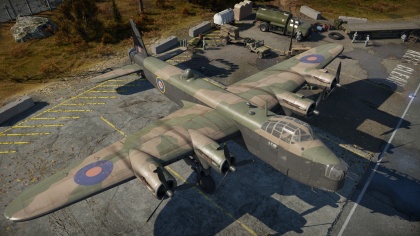Stirling B Mk I
Contents
| This page is about the British bomber Stirling B Mk I. For the other version, see Stirling B Mk III. |
Description
The Stirling B Mk I is a rank III British bomber
with a battle rating of 4.0 (AB/RB) and 5.0 (SB). It was introduced in Update 1.55 "Royal Armour".
The Stirling B Mk I plays as a standard long range bomber. Climbing to high altitudes and using alternative routes to bomb targets to prevent engagement is recommended as the Stirling B Mk I likely wont survive any. It is not well defended at all with low calibre machine guns, which is less effective at the battle rating of 4.3/5.0. It is extremely flammable and fragile when engaged with cannons, although it may survive machine gun fire lower than 10 mm calibre.
General info
Flight Performance
Describe how the aircraft behaves in the air. Speed, manoeuvrability, acceleration and allowable loads - these are the most important characteristics of the vehicle.
| Characteristics | |||||||
|---|---|---|---|---|---|---|---|
| Stock | |||||||
| Max Speed (km/h at 4,268 m) |
Max altitude (meters) |
Turn time (seconds) |
Rate of climb (meters/second) |
Take-off run (meters) | |||
| AB | RB | AB | RB | AB | RB | ||
| 372 | 358 | 6098 | 51.9 | 53.8 | 5.3 | 5.3 | 1,170 |
| Upgraded | |||||||
| Max Speed (km/h at 4,268 m) |
Max altitude (meters) |
Turn time (seconds) |
Rate of climb (meters/second) |
Take-off run (meters) | |||
| AB | RB | AB | RB | AB | RB | ||
| 422 | 396 | 6098 | 48.3 | 50.0 | 11.4 | 7.9 | 1,170 |
Details
| Features | ||||
|---|---|---|---|---|
| Combat flaps | Take-off flaps | Landing flaps | Air brakes | Arrestor gear |
| ✓ | ✓ | ✓ | X | X |
| Limits | ||||
|---|---|---|---|---|
| Wing-break speed (km/h) |
Gear limit (km/h) |
Combat flaps (km/h) |
Max Static G | |
| + | - | |||
| 350 | ~4 | ~2 | ||
| Optimal velocities | |||
|---|---|---|---|
| Ailerons (km/h) |
Rudder (km/h) |
Elevators (km/h) |
Radiator (km/h) |
| < 350 | < 350 | < 350 | > 302 |
| Compressor (RB/SB) | ||
|---|---|---|
| Setting 1 | ||
| Optimal altitude | 100% Engine power | WEP Engine power |
| 762 m | 1,325 hp | 1,656 hp |
| Setting 2 | ||
| Optimal altitude | 100% Engine power | WEP Engine power |
| 4,267 m | 1,200 hp | 1,500 hp |
Survivability and armour
Examine the survivability of the aircraft. Note how vulnerable the structure is and how secure the pilot is, whether the fuel tanks are armoured, etc. Describe the armour, if there is any, and also mention the vulnerability of other critical aircraft systems.
- 8 mm Steel plate in the left pilot's seat.
- 9 mm Steel plate in front of engine cooling systems.
Armaments
Suspended armament
The Stirling B Mk I can be outfitted with the following ordnance:
- 27 x 250 lb G.P. 250 lb Mk.IV bombs (6,750 lb total)
- 27 x 500 lb G.P. 500 lb Mk.IV bombs (13,500 lb total)
- 9 x 1,000 lb M.C. 1,000 lb Mk.I bombs (9,000 lb total)
Defensive armament
The Stirling B Mk I is defended by:
- 2 x 7.7 mm Browning .303 machine guns, nose turret (1,000 rpg = 2,000 total)
- 2 x 7.7 mm Browning .303 machine guns, dorsal turret (500 rpg = 1,000 total)
- 4 x 7.7 mm Browning .303 machine guns, tail turret (1,000 rpg = 4,000 total)
- 1 x 7.7 mm Browning .303 machine gun, ventral turret (1,000 rpg)
Usage in battles
Offensive
The Stirling B Mk I is very large and very heavy. It has multiple loadout options of bombs, which can get 3 bases with its heavier bombloads. This is also the heaviest bombload at its tier.
Defensive
Its onboard LMG defensive armament most probably will not be effective against targets at BR 4.3/5.0. Defensive armament does not have 360° coverage, although it is somewhat effective against attacks from behind, where you can fire the dorsal/ventral and tail guns in unison.
Mobility
The Stirling B Mk I has 4 engines with enormous wing surface area, It makes for a good climb rate but it also struggles with heavier bombloads. Fortunately, the control surfaces are extremely large as well, which helps a lot with controlling the plane.
Tactics
The Stirling has a huge payload but delivering it may be challenging. This is because the plane is very weak for a BR 5.0. Going straight to bomb and enemy base as soon as you spawn is suicide. Keep in mind that if an enemy plane finds you, you are dead. It is much bigger than a Wellington and catches fire easier; a short burst from a Bf 109 or La-7 and you go down in flames. Stay away from any enemy plane if possible as your defensive armament is almost useless and you can only rely on stealth (WWII Stirlings were used primarily on night missions). Depending on the map, you can choose to go at tree top level, or take a long route away from the combat zone, hidden in the clouds. When attacking ground targets at low altitude, pay attention to anti-aircraft guns and trucks, they can set you on fire easily.
Specific enemies worth noting
Any fighter is very dangerous for the Stirling B Mk I. The Bf 109, La-5, La-7, A6M, and the C.205 are the most lethal opponents. If any risk of engagement is present, the player should seek fighter support.
Counter-tactics
Directly firing and not using any tactics is enough to kill the Stirling B Mk I. Its defensive armament can be ignored, although attacking from the top will minimize damage. Aiming at wings where the fuel tanks are is recommended, as it will most probably result in a fire.
Manual Engine Control
| MEC elements | ||||||
|---|---|---|---|---|---|---|
| Mixer | Pitch | Radiator | Supercharger | Turbocharger | ||
| Oil | Water | Type | ||||
| Not controllable | Controllable Not auto controlled |
Not controllable Not auto controlled |
Controllable Not auto controlled |
Separate | Controllable 2 gears |
Not controllable |
Modules
| Tier | Flight performance | Survivability | Weaponry | ||
|---|---|---|---|---|---|
| I | Fuselage repair | Radiator | SUBC mk.I | ||
| II | Compressor | Airframe | Turret 7 mm | ||
| III | Wings repair | Engine | MBC mk.III | ||
| IV | Engine injection | Cover | New 7 mm MGs (turret) | ||
Pros and cons
Pros:
- Rear gunner and top fuselage gunner can fire in unison (If the rear gunner gets knocked-out, The top gunner will still be able to defend)
- Best payload at rank III, enough to destroy 3 bases
Cons:
- Not "short" at all
- Cannot take many hits
- Flammable
- Mediocre LMG defence
- Almost no armour
- Vulnerable fuel tanks
- Very bad climb rate with full payload
- Sways very heavily in RB when trying to climb
- Huge glass cockpit means near-certain death from head-on attacks
History
Describe the history of the creation and combat usage of the aircraft in more detail than in the introduction. If the historical reference turns out to be too long, take it to a separate article, taking a link to the article about the vehicle and adding a block "/ History" (example: https://wiki.warthunder.com/(Vehicle-name)/History) and add a link to it here using the main template. Be sure to reference text and sources by using <ref></ref>, as well as adding them at the end of the article with <references />. This section may also include the vehicle's dev blog entry (if applicable) and the in-game encyclopedia description (under === Encyclopedia Info ===, also if applicable).
Media
Excellent additions to the article would be video guides, screenshots from the game, and photos.
See also
Links to the articles on the War Thunder Wiki that you think will be useful for the reader, for example:
- reference to the series of the aircraft;
- links to approximate analogues of other nations and research trees.
External links
Paste links to sources and external resources, such as:
- topic on the official game forum;
- encyclopedia page on the aircraft;
- other literature.
| Britain bombers | |
|---|---|
| Torpedo | Swordfish Mk I · Swordfish Mk II · ▄Avenger Mk II |
| Dive | V-156-B1 |
| Hydroplanes | ▄Catalina Mk IIIa · Sunderland Mk IIIa · Sunderland Mk V |
| Light | Blenheim Mk IV · Beaufort Mk VIII · ▄Hudson Mk V · Brigand B 1 |
| Based on A20 | ▄Havoc Mk I · ▄Boston Mk I · ▄DB-7 |
| Hampden | Hampden Mk I · Hampden TB Mk I |
| Wellington | Wellington Mk Ic · Wellington Mk Ic/L · Wellington Mk III · Wellington Mk X |
| Halifax | Halifax B Mk IIIa |
| Stirling | Stirling B Mk I · Stirling B Mk III |
| Lancaster | Lancaster B Mk I · Lancaster B Mk III |
| Lincoln | Lincoln B Mk II |
| Shackleton | Shackleton MR.Mk.2 |





